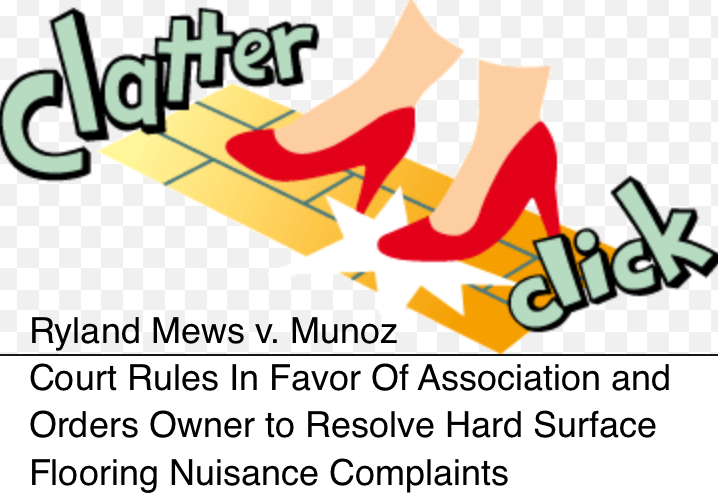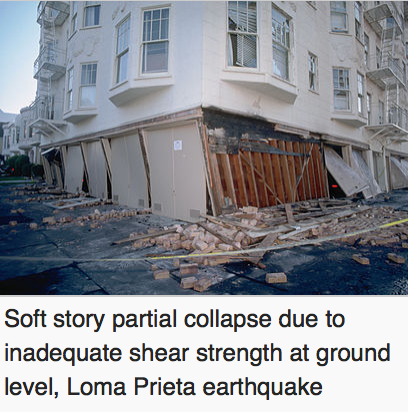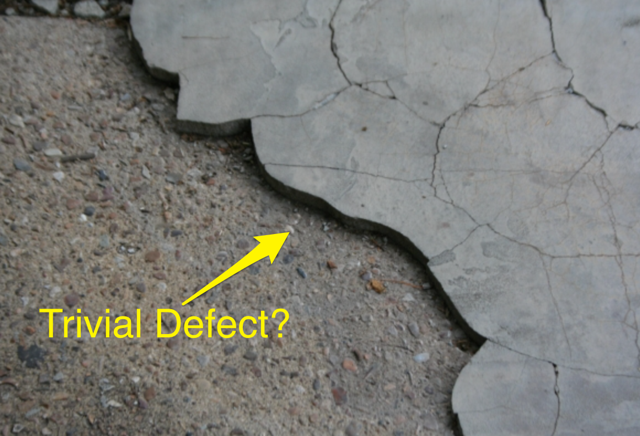By David Swedelson, Partner at SwedelsonGottlieb, Community Association Attorneys

Many homeowners want hard surface flooring instead of carpet. And they will often present a prescription from their doctor for a hard wood floor in an effort to get around their association’s restrictions or prohibitions on hard surface flooring. Yes, a prescription for a hard wood floor on a doctor’s prescription form. But anyone that works with condos knows that hard surface flooring may create nuisance problems for the downstairs neighbor. And when the downstairs neighbor complains to the board about the hard surface floor that was not approved and violates the CC&Rs, the board is sometimes reluctant to take legal action thinking that a court is not going to rule in its favor. The California Court of Appeal debunked that thinking in the case of Ryland Mews v. Munoz upholding a California condominium association’s ability to limit hard surface flooring in response to nuisance complaints.
The story in the Ryland Mews case is all too familiar. Munoz moved into their upstairs unit at Ryland Mews and replaced the carpets with hardwood floors allegedly to accommodate the wife’s severe dust allergy. And it was not to soon after that when the downstairs neighbors complained about the additional noise they were now hearing.
When the association’s manager wrote to Munoz regarding the complaints and the fact that the alteration of the flooring was made without prior approval of the association, Munoz did not respond within the 30 days Management had given them. Management wrote to Munoz again, this time requesting Alternative Dispute Resolution (ADR) under the Davis-Stirling Act. Munoz still did not respond to the Association’s Request for Resolution.
Continue reading





 As we previously reported, (
As we previously reported, (
 I recently posted to HOALAWBLOG an article entitled
I recently posted to HOALAWBLOG an article entitled 
 I recently assisted a large condominium association in dealing with a claim by an owner that she had fallen and injured herself after tripping on a common area walkway. Management looked at the area where this woman claimed to have fallen, and all they could find was a slightly raised area of concrete – a trivial defect. It reminded me of a 2011 Court of Appeal decision in the case of
I recently assisted a large condominium association in dealing with a claim by an owner that she had fallen and injured herself after tripping on a common area walkway. Management looked at the area where this woman claimed to have fallen, and all they could find was a slightly raised area of concrete – a trivial defect. It reminded me of a 2011 Court of Appeal decision in the case of 
 On March 29, 2016, we posted an article regarding the SB Liberty, LLC, v. Isla Verde Association, Inc. Court of Appeal decision that confirms the law that only owners or members of an a California community association are entitled to attend association board meetings.
On March 29, 2016, we posted an article regarding the SB Liberty, LLC, v. Isla Verde Association, Inc. Court of Appeal decision that confirms the law that only owners or members of an a California community association are entitled to attend association board meetings.  It is a common scenario. A homeowner (usually disgruntled or in trouble with their association) either wants their attorney to attend a board meeting with them or in their place. Often, we hear about it after the meeting where the attorney appeared on behalf of their client and intimidated the board. This situation raises three hotly contested issues: (1) Do homeowners have the right to have their attorney present at board meetings? (2) Can homeowners delegate their right to attend board meetings to nonmembers? and (3) Does it make a difference in delegating powers to attend board meetings if the owner of a unit is a natural person or an entity? We have not had a solid answer to these questions. That is, until the Court of Appeal came down with its decision in the case of
It is a common scenario. A homeowner (usually disgruntled or in trouble with their association) either wants their attorney to attend a board meeting with them or in their place. Often, we hear about it after the meeting where the attorney appeared on behalf of their client and intimidated the board. This situation raises three hotly contested issues: (1) Do homeowners have the right to have their attorney present at board meetings? (2) Can homeowners delegate their right to attend board meetings to nonmembers? and (3) Does it make a difference in delegating powers to attend board meetings if the owner of a unit is a natural person or an entity? We have not had a solid answer to these questions. That is, until the Court of Appeal came down with its decision in the case of  Many of our condo and HOA association clients have employees. Some have many employees. And this week, many of those employees are talking about and betting on the game, oftentimes while at work. In fact, some employees have set up betting pools encouraging other staff members to place wagers on various aspects of the game. Legal? What about all that cash that is being passed amongst employees? And what about the lost productivity?
Many of our condo and HOA association clients have employees. Some have many employees. And this week, many of those employees are talking about and betting on the game, oftentimes while at work. In fact, some employees have set up betting pools encouraging other staff members to place wagers on various aspects of the game. Legal? What about all that cash that is being passed amongst employees? And what about the lost productivity?